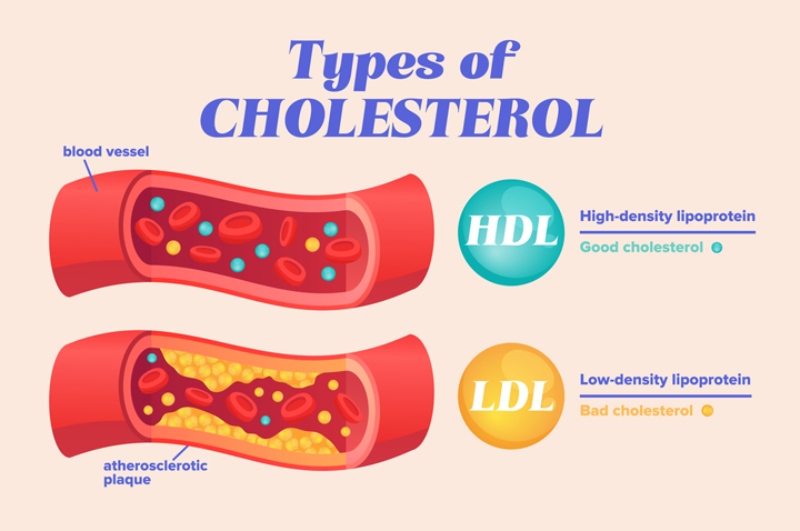1. Monounsaturated Fats
Dr. Vivek Kumar is known as the Best Cardiologists in Sarita Vihar, as per Dr Vivek a rich diet in monounsaturated fats lowers cholesterol levels. Monounsaturated fat helps to keep blood cholesterol stable by lowering LDL cholesterol.
It also results in a reduced risk of heart diseases and heart stroke. A diet high in monounsaturated fats replaces saturated fats in the body, resulting in a 6% to 10% reduction in LDL and total cholesterol levels.
A low-fat diet, according to research, lowers cholesterol levels in the body. However, it lowers HDL cholesterol and raises triglycerides, which can be harmful to the body.
In contrast, another study found that a diet high in monounsaturated fats is good for the body. It reduces LDL cholesterol while increasing HDL.Consult an expert before making any dietary changes.
Cholesterol oxidation in the body can react with free radicals, resulting in clogged arteries. Monounsaturated fats have been shown to reduce cholesterol oxidation, lowering the risk of heart attack and stroke.
To provide the body with the necessary amount of monounsaturated fats, include olive oil, unsaturated fat-rich nuts, canola oil, avocados, olives, and nut butter.
Carbohydrates can raise triglycerides while lowering HDL cholesterol. Meanwhile, monounsaturated fat changes lipoproteins, increasing HDL cholesterol while decreasing triglycerides.
2. Diet High in Omega-3 Fatty Acids
According to Best Cardiologist in South Delhi, An omega-3-rich diet promotes healthy cholesterol levels while also increasing HDL cholesterol levels this is because omega-3 aids in cell development and cell health. It also lowers the body’s LDL cholesterol and triglycerides. As a result, the risk of coronary heart disease and heart stroke is reduced.
A diet high in omega-3 fatty acids promotes healthy cholesterol levels while increasing HDL cholesterol levels. As a result, it lowers the risk of cardiovascular diseases such as heart attacks. Furthermore, according to one study, eating omega-3-rich fish twice a week can significantly lower triglyceride levels.
The substitution of carbohydrates for polyunsaturated fats resulted in lower blood glucose and insulin levels. It eventually decreased the risk of developing type 2 diabetes.
Tuna, salmon, mackerel, herring, shellfish, and shrimp are high in omega-3 fatty acids. As a result, they can help lower cholesterol levels and reduce the risk of heart disease.
3. Loss of Weight
As per Best Heart Doctor in South Delhi, Obesity can raise cholesterol levels, increasing the risk of coronary disease. Gaining 4.5kg of excess fat, for example, results in approximately 10mg of excess cholesterol per day.
As a result, losing weight can help lower cholesterol levels. Furthermore, a study found that people who lost 5-10% of their body weight saw a significant reduction in cholesterol and triglycerides.
Reduced calorie intake, increased fibre consumption, and lower daily saturated fat intake can help with weight loss while maintaining cholesterol levels.
4. Restrict smoking
Cigarette smoking can cause harmful coronary disease because it disrupts the body’s handling of cholesterol. Smokers’ immune cells are unable to return cholesterol to the liver via blood vessel walls. These cells are known as dysfunctional immune cells, and they cause clogged arteries.
Acrolein is a dangerous chemical compound found in cigarettes. It can reduce HDL cholesterol transport in the body by absorbing it through the lungs into the bloodstream. This raises LDL cholesterol levels over time, increasing the risk of coronary heart disease.
5. Limit your alcohol consumption
There is no direct link between alcohol and cholesterol. However, excessive alcohol consumption can harm the liver and lower HDL cholesterol levels. It also raises the risk of blood clots, heart attacks, and heart failure.
The effects of various types of alcohol on cholesterol levels vary. For example, beer increases LDL cholesterol and triglyceride levels. Alcoholic beverages, such as rum and vodka, also raise triglyceride levels.
Furthermore, their high calorie content increases the risk of cardiovascular disease. As a result, you should avoid alcohol. However, even if you drink alcohol, you should limit your consumption because alcohol consumption raises cholesterol levels.
6. Sterols and Stanols from Plants
Plant sterols and stanols are plant-derived cholesterol. It’s similar to how cholesterol is absorbed through the diet. Plant sterols and stanols lower the risk of heart disease by decreasing LDL cholesterol levels in the body. When plant sterols and stanols are absorbed through the diet, they inhibit the absorption of cholesterol in the body.
Plant sterols and stanols are available in some supplements. Nonetheless, plant sterols and stanols are present in vegetable oils and are added to a variety of other oils and butter substitutes.
Dr. Vivek Kumar is a cardiologist and heart specialist in South Delhi, To get best advice or 2nd opinion about your heart problems can connect Dr vivek kumar senior consultant Cardiology and Electrophysiology Indraprastha Apollo Hospital Sarita vihar New Delhi. www.hridayica.com
